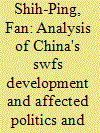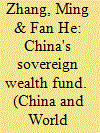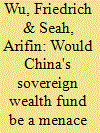|
|
|
Sort Order |
|
|
|
Items / Page
|
|
|
|
|
|
|
| Srl | Item |
| 1 |
ID:
098762


|
|
|
| 2 |
ID:
143774


|
|
|
|
|
| Summary/Abstract |
This study analyses the changing investment climates for China’s sovereign wealth fund, the China Investment Corporation (CIC), in the US, the UK and France. It assesses legislative flexibilities, public opinions and macroeconomic conditions in the three polities in order to ascertain whether the investment review process of each is susceptible to politicization, and if such susceptibility has changed in line with macroeconomic variations. The study finds that the US investment review process is susceptible to politicization and that such politicization has likely taken place following the recovery from the global financial crisis, resulting in a worsened investment climate for Chinese investors, including CIC. The investment review processes in the UK and France have not been susceptible to politicization. Moreover, negative macroeconomic conditions for each of the two countries following the eruption of the Eurozone crisis have resulted in an improved investment climate for CIC, although brought about by the proactive stance of governments and companies rather than by any de-politicization.
|
|
|
|
|
|
|
|
|
|
|
|
|
|
|
|
| 3 |
ID:
086482


|
|
|
|
|
| Publication |
2009.
|
| Summary/Abstract |
The establishment of sovereign wealth funds in large developing countries has generated hot debate among participants in the international financial market. When accumulated foreign exchange reserves surpass a sufficient and an appropriate level, the costs, risks and impacts of holding reserves on the macroeconomy of a country need to be considered. The Chinese Government established China Investment Corporation (CIC) in 2007 to diversify its investment of foreign reserves and to raise investment income. However, because of certain conflicts of interest and institution-design caveats, CIC possesses some internal weakness, including a vague orientation, mixed investment strategies and an inefficient bureaucratic style. Although the subprime crisis has softened certain regulations and lessened rejection by the USA of CIC potential investments, the increased volatility and uncertainty of the market means that CIC is facing some new challenges in terms of its investment decisions. Moreover, CIC is competing with other Chinese investment institutions for injections of funds from the Chinese Government.
|
|
|
|
|
|
|
|
|
|
|
|
|
|
|
|
| 4 |
ID:
104215


|
|
|
|
|
| Publication |
2011.
|
| Summary/Abstract |
China has established two of the world's newer large sovereign wealth funds (SWFs): the official China Investment Corporation (CIC), and the non-official and less transparent State Administration of Foreign Exchange (SAFE) Investment Company (SIC). Both provide alternative investment opportunities for China's exploding foreign exchange reserves, at US$2.4 trillion at the end of 2009, the largest in world history. This paper will address how China has accumulated its huge and growing foreign exchange reserves, and what roles these reserves, until 2007 managed only by the State Administration of Foreign Exchange (SAFE), have played in the establishment and development of China's two new SWFs. We will look specifically at why China's foreign exchange reserves have developed, and how the new SWFs are a part of broader efforts to provide investment alternatives for China's ballooning foreign exchange surpluses, particularly in light of the inflow of 'hot' foreign speculative funds. We will then point out some of the difficulties for China's financial officials of SWFs as they try to pursue multiple and sometimes competing goals, set by boards of directors representing different bureaucratic and economic interests, all within the context of a general lack of transparency and a rapidly growing economy. Finally, we will present our conclusions about the future roles of the two SWFs as well as of the policies being developed to decentralize foreign exchange reserve holdings while at the same time not slowing the growth of China's foreign trade surpluses, nor its foreign direct investments, nor its overall economic growth. We will also examine the effects of US-promoted Chinese currency appreciation on the future of China's foreign exchange reserves and its sovereign wealth funds.
|
|
|
|
|
|
|
|
|
|
|
|
|
|
|
|
| 5 |
ID:
082642


|
|
|
|
|
| Publication |
2008.
|
| Summary/Abstract |
The sovereign wealth club acquired a new member with the official launch of the China Investment Corporation (CIC) on 29 September 2007. The arrival of CIC has further heated up debate regarding sovereign wealth funds (SWFs) and their potential implications for global financial markets. This is because, in carrying out its investments, CIC can tap into China's huge official foreign exchange reserves, which by April 2008 had surged to US$1.76tn. CIC's initial working capital of US$200bn makes it the fifth largest SWF in the world today. This article seeks to analyze CIC's investment strategies, as well as their potential economic and political implications for global as well as US financial markets
|
|
|
|
|
|
|
|
|
|
|
|
|
|
|
|
|
|
|
|
|